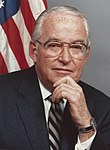Richard Edmund Lyng
Richard Edmund Lyng (born June 29, 1918 in San Francisco , California , † February 1, 2003 in Modesto , California) was an American politician ( Republican Party ) who belonged to the cabinet of US President Ronald Reagan as Secretary of Agriculture .
Life and work
Lyng received his bachelor's degree from the University of Notre Dame in Indiana in 1940 . He then returned to his Californian homeland, where he worked in his father's seed business. During the Second World War he served in the US Army and took part in battles in the Pacific . In 1945 he retired from the army with the rank of Lieutenant Colonel .
In Modesto in 1949 he took over the post of president in the family business, which he headed until 1967. In 1953 he also served as President of the California Seed Association .
Political career
Richard Lyng's only candidacy for public office was in 1966 when he was unsuccessful in the California Senate election . As a result, he limited himself to working for elected politicians. He advised Ronald Reagan on agricultural issues before he was elected Governor of California; after Reagan took office in January 1967, the latter appointed Lyng as deputy agriculture minister in his administration. He later rose to head the agency.
After Richard Nixon became US President in 1969, Lyng served as Deputy Secretary of Agriculture in the new administration, with responsibility for marketing and consumer affairs. He remained in this post until Nixon's resignation in 1974. For his successor Gerald Ford , he campaigned as chairman of the interest group Farmers for Ford in the run-up to the presidential election in 1976 . Even four years later he was again involved in the election campaign and belonged to the staff of Ronald Reagan as Director of the Department of Agriculture and Food ( farm and food committee to).
Reagan won the election and gave Lyng the post of Assistant Secretary of Agriculture. The task of the traveling lobbyist fell to him. In 1986 he was promoted to ministerial successor to John Rusling Block . With the end of Reagan's presidency in January 1989, Richard Lyng also left the government.
Web links
- Richard Edmund Lyng in the Miller Center of Public Affairs of the University of Virginia (English)
- The Political Graveyard
| personal data | |
|---|---|
| SURNAME | Lyng, Richard Edmund |
| BRIEF DESCRIPTION | American politician |
| DATE OF BIRTH | June 29, 1918 |
| PLACE OF BIRTH | San Francisco , California |
| DATE OF DEATH | February 1, 2003 |
| Place of death | Modesto , California |

